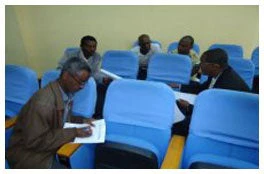 At first, the atmosphere was stilted and painfully awkward. No one seemed to want to speak – certainly not the journalists and the representatives of the NGO community that were huddled in the back of the room. Up front, the representative of the Ethiopian government seemed a little bemused by the facilitated process that was unfolding very slowly before them.
At first, the atmosphere was stilted and painfully awkward. No one seemed to want to speak – certainly not the journalists and the representatives of the NGO community that were huddled in the back of the room. Up front, the representative of the Ethiopian government seemed a little bemused by the facilitated process that was unfolding very slowly before them.
Clearly, this was not something that they were used to. But as the civil society workshop convened by members of the multi-stakeholder group (MSG) that had been formed to lead and govern the pilot phase of the Construction Sector Transparency Initiative (CoST) in Ethiopia warmed up, so too, eventually, did the mood in the room shift.
Gradually the conversation about the various pilot projects that had been the subject of the pilot began got going. Apparently for the first time, questions were being raised about the details of, for example, a big road construction project.
The CoST process of disclosing ‘material project information’ had revealed the exaggerated amount of excavation required for a 33 km rural road between Gindebir to Gobensa in Southern Ethiopia.
The MSG was crucial in persuading the Ethiopian Roads Authority and the Supervising Engineer to accept the CoST recommendation that an alternative design be developed for the 2.5 km stretch of the road; it is expected to lead to a saving of around USD$2.3 m. The Ethiopian Roads Authority suspended the responsible designers for two years for actions uncovered in that project and several other projects.
The multi-stakeholder approach proved essential to this positive impact. The civil society workshop sparked considerable media interest in the project, but what was abundantly clear to me as the facilitator of the workshop was the importance of understanding the political economy context.
I came to realize that day in Addis that this was the first time that many of the participants had really ever conducted a meaningful engagement. It was the first time that government officials responsible for the construction projects, as well as the private sector contractors, had been required to answer questions from civil society representatives or the media. What was fascinating was that once the initial discomfiture was overcome, they even seemed to enjoy the opportunity to defend their positions and justify their professional choices.
It really was ‘accountability in action’.
A key part of the theory of change of a multi-stakeholder initiative (MSI) is that it will ‘level the playing field’. It is certainly true that the most effective MSIs achieve this. At least at the ‘MSI table’ weaker stakeholders have an opportunity to look more powerful stakeholders in the eye and to persuade them of their positions.
Of course, beyond the MSI process, little or nothing may change. And that is part of the reason why any MSI must be brave enough to confront its political economy – namely, the underlying power relations and structure of who has power and who does not, and how that power is deployed, both inside and outside the MSI.
While there may be occasions when what I call ‘tactical technocracy’ should be deployed, to reassure anxious stakeholders who fear the politics of the process, it will generally be a counter-productive exercise in naivety to initiate and then build an MSI by pretending that it is a purely technical process that is somehow magically divorced from the surrounding political economy context.
Providing for political economy will have implications for the process that is designed, the governance arrangements and procedures for the MSI itself, the training and preparation of the leadership and staff of the MSI, and for the ‘soft diplomacy’ that may be required to increase trust between members of the MSI who are not used to working together and may have long-standing prejudices against each other.
This is a key part of the investment in the governance ‘infrastructure’ that is necessary if an MSI is to stand any real chance of prospering.
NOTE: Image Source: Construction Sector Transparency Website: http://www.constructiontransparency.org/ethiopia


Join the Conversation